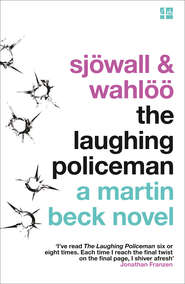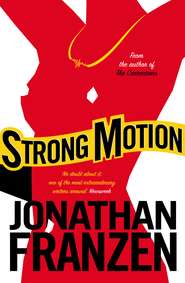По всем вопросам обращайтесь на: info@litportal.ru
(©) 2003-2024.
✖
The Twenty-Seventh City
Автор
Год написания книги
2018
Настройки чтения
Размер шрифта
Высота строк
Поля
She dragged him out to the back patio and sat him down. She realized he wasn’t drunk at all. “All these people,” he said. “All these people, worrying about the poor. They don’t have the faintest idea what it’s like to be poor … All these people studying. It makes me uncomfortable. It seems so … so small. I mean, how do they justify themselves? All these people. All these people. They’ve never in their lives had to work a job they didn’t like.”
All these people were Barbara’s people.
If she stopped trying, she and Martin wouldn’t see them anymore.
She stopped. The parties stopped. She stayed at home; she got a sinus infection. Men were circling the moon, and she sat and rested in a kitchen chair, wishing she could taste. It was the worst infection of her life. In the shower she licked the soap off her lips and found it sweet, like one of the more congenial poisons. Cooking was a chemistry lab. Heated beef turned gray, heated chicken white. Bread had low tensile strength. A liquid could be extracted from an orange, it was volume in a glass, it was 150 milliliters.
The infection continued out of February and into March, but spring was just a change in the light, a dampening of the cold, nothing more. She saw a doctor, who told her it was only viruses, she needed to sleep a lot and let it run its course. Eventually she could breathe freely, but she still couldn’t taste. She started smoking again. The smoke was frosty and almost chewable, and the pain in her throat, divorced from flavor, had an electrical quality, like a leakage of current. Was it possible that people tasted what they spoke? It was possible. Words dwelt in her skull like hammerheads, falling around on their rigid claws. Martin blamed her. “What’s wrong with you?” Go to bell, I have a cold. “You should try to get some sleep.” Go to bell. A steak could be bent. Radishes couldn’t. Every morning she licked at the soap, always hoping, and then, in April, something gave and she realized in her closet that she was smelling No-Moth. It was exactly as she remembered it. But now with each taste she rediscovered there came a sense of private ownership. Tastes and smells no longer seemed like communal stocks of which each person partook according to need and predisposition. They seemed like property. She was reading Sartre, and he hit her like a ton of bricks. She felt wild. She had insides, and at the time they weren’t lonely places. Ask Martin about those years, and he’d tell you a different story. Hers was simple: she’d started to live for herself, not both of them. She’d noticed that she had a daughter.
“And how is this different from the San Andreas fault?”
“The San Andreas is on the edge of the continental plate – plates, of course, are the rigid pieces of the earth’s crust that make up the continents and ocean floors …”
The oven was warming the kitchen, but Barbara didn’t smell cake, only the heat of her sinuses. The dishes seemed a creation of the sink, which heaved them onto the counter, weird saucers, wooden spoons. In December more people from House magazine, including a writer named John Nissing whom Barbara had so far met only by telephone, would be coming to shoot the house’s interior. They should have come today instead, she thought, and caught the house au naturel, caught Barbara in her chair, bowing in confusion and looking at the flour-dusted wrists in her lap. In her dream last night Luisa had had these hands, these rings, these wrinkles.
When Audrey’s younger daughter Mara was Luisa’s age she’d already run away from home three times. She’d been expelled from Mary Institute and arrested for shoplifting and possession. Concerned relatives, namely Barbara and her father, agreed that the Ripley household was (to say the least) doing Mara little good, and Barbara overrode Martin’s objections and offered to take the girl in until she cooled off or got a diploma. Mara had always, to Barbara’s discomfiture, looked up to her and liked her, as the token grownup she could stand. She accepted the invitation, and Barbara tried to be understanding and be a good foster mother, and repair some of the damage. But after two months, on a Sunday in March, she and Martin returned from a brunch and found Luisa, who was ten, sitting in the kitchen with a frown on her face. Her indirection was elaborate.
“Sometimes,” she said, “I think about rooms we don’t use?” She felt sorry for the unused rooms. And all the things in them? Like in the basement. And on the third floor? It was funny how she never went up there? Did Mommy ever go up there? Wasn’t there an old sewing machine with pedals? And lots of things of Daddy’s? And an old sofa, sort of?
Barbara calmly cored an apple for her and sent Martin up to the third floor, where Mara (who was supposedly “outside someplace”) and a boy her age were hastily dressing. Martin said Mara had to go, and Barbara agreed. She was chastened to discover that only Luisa mattered to her, that a scratch on her daughter’s psyche worried her more than a festering hole in Mara’s. Did Luisa know the suitcases in the front hall were the direct result of her testimony? Had she made a connection between having sex and getting thrown out? Did she know it was done on her behalf? A very peculiar sort of distrust arose in Barbara: how much are we really keeping from her? A lot, or only a little? She wished she’d been granted a mind unable to perceive so clearly the mathematics of Luisa’s growth, or a body that could have given her more than one child, anything to relieve the terrible specificity of her conscience. If only it didn’t matter exactly what became of Luisa, and what she became, and how it happened, through what fault and what virtues of Barbara’s. If only she were like Audrey, to whom things happened unaccountably. Or like Martin, who didn’t seem to care.
Upstairs she heard footsteps. The thump of books. Luisa had come in through the front door and gone straight to her room.
Three weeks passed. It was the day before Thanksgiving, and the high school was in turmoil. After fifth hour the clots of pep, the organizers and combatants, began to rove the halls at will. They carried orange and black threats, threw orange and black confetti, stapled orange and black crepe paper to the ceiling tiles. It was Pep Wednesday, the day before the Statesmen played the Kirkwood Pioneers. At three o’clock the Rally would be held, and then at eight o’clock the Bonfire, when five hundred of the faithful would gather at Moss Field to witness the burning, in effigy, of Kirk E. Wood. This true Pioneer would be roasted, tossing in a danse macabre, while smoke and cheers drove the school spirit to painful heights for tomorrow. Tomorrow was Turkey Day. Tomorrow was the day.
Mr. Sonnenfeld shut the door. He cast his pinkened eyes on the class before him. He stuck out his lower lip and blew air through the thin hair on his forehead. “Forty-five minutes to go,” he said. “Be glad when it’s all over.”
The class did not look at him. They heard his words in mute boredom, as a humbling judgment on them. Yes, sir, it’s just like you say. Fluorescent light filmed their tired hair, tired jeans, tired purses. They were a group as gray as the cold clouds outside. They came because Sonnenfeld would not fail anyone who attended class regularly. The boy next to Luisa in the back row was slouched so low in his seat that his knees butted the underside of his desk. His name was Archie. He was black. He was drawing on his desk with a pencil, expanding a solid gray dot into a larger dot.
Luisa rubbed the back of her hand across her nostrils. Whenever she did this she could smell Duane. Washing masked the smell, but not for long. He came from inside her. More and more his smoky human smell lodged even in her nostrils; in her brain.
Her mother had said: “What do you keep doing that for?”
“Doing what?” She’d dropped her hand, locking it between her legs. She saw how people accidentally develop disgusting nervous habits.
“Smelling your hand like that.”
“I’m—not.”
Mr. Sonnenfeld moistened his fingertips and walked up and down the aisles distributing copies of poems. “I’ve selected four poems to introduce you to the work of William Carlos Williams,” he said. Luisa took her copies but was careful not to show immediate interest in them. She was only here because this course fit into her unruly schedule this quarter. She felt conspicuous. One row over, in the corner, a girl named Janice Jones was watching her. Janice was wearing loose jeans with no belt, a biker’s jacket, and an embroidered Indian shirt with the top four buttons unbuttoned. She had tiny, stoned-looking eyes. Her name was scrawled on lockers and walls around the school, JANIS JONES GIVES GOOD HEAD, JJ = JOBS. Every day she stared at Luisa for no apparent reason; no malice when their eyes met, no smiles, no connection.
“… I think when you look at these poems you’ll see a lot of similarities with Ezra Pound and the other imagists we started with.” Sonnenfeld’s collar bit deeply into the roll of fat around his neck as he handed the mimeographs across two empty desks to Janice Jones. He nearly lost his balance. Archie sniffed. He seemed to have seen it without looking up.
“Now, first of all, has anyone ever read anything by Williams?” Sonnenfeld hopped backwards and sat on his desk. He pulled up his pants legs to relieve the stretch.
White pages turned. No one answered. This was the only class Luisa had in which she hardly knew anyone. People she knew would have said something.
“Does anyone know what Williams did for a living?”
“He’s a faggot,” Archie muttered.
“Archie?”
Continuing to draw his dot, Archie smiled and did not elaborate. Trouble had been brewing between him and Sonnenfeld since the quarter started two weeks ago, and the mood was dangerous today. Usually Archie was silent in class. He was loud in the halls, though, where all the black kids lost their shyness. They scared Luisa. They didn’t like her, and she felt she’d never be able to relax enough to indicate neutrality, to give them even a small sign that she didn’t necessarily dislike them.
Sonnenfeld put his hands on his hips and assumed a disappointed tone. “William Carlos Williams was a doctor. He lived all his life in Paterson, New Jersey. As we go on, we’ll find that it’s not unusual for American poets to have other full-time professions. Many have been teachers. Wallace Stevens, who’s perhaps our greatest poet of this century, a very hard poet, worked for an insurance company. He was a vice president when he died. Sylvia Plath, whom I’m sure you’ve all heard of, was a mother and a housewife.”
Vague guilt fluttered in Luisa’s stomach. The Wallace Stevens book her mother had given her.
“Archie?”
Archie shook his head patiently. Luisa looked at his long, angular fingers. She thought of Duane’s hands. On the palm of her own left hand his name was written in black ballpoint ink. She’d written it in Calculus, half-asleep. She’d hardly slept last night. For the third time in a month, she’d sneaked out to be with Duane. She’d gotten to the sundeck from her bedroom window, and from the sundeck she’d climbed, knees cracking, feet trembling, down the step-like quoins to the front yard. It was amazingly easy, like an open cash register and no one around. Her parents never went into her room after 11:00. The last Lockwood Avenue bus to U-City came at 12:05. She could see Duane any night she wanted to, and she liked it better at night, when she could see herself, a white semi-reflection in the bus window staring into her face and unmoved by the streetlights and neon floating through her. Duane was waiting at the bus stop, his scarf under his chin, a lock of hair above his eyebrows. He shook his head. He could never believe she was actually on the bus.
“… Amy Lowell and Ezra Pound, who were both profound influences on Williams.”
“Bow bow bow,” said Archie, snatching at an imaginary bug in the air.
“Archie?” Sonnenfeld was getting mad. The pitch of his voice had risen.
Janice Jones had fallen asleep.
Luisa looked down at the copies on her desk, THE RED WHEELBARROW. So much depends upon a red wheelbarrow glazed with water beside the white chickens. That was easy enough. She liked short poems. She went on to the next one and, finding it just as easy, kept reading. She didn’t stop until she sensed an unanswered question hanging in the air. Sonnenfeld had asked them something. She ran the preceding seconds through her memory and heard, from afar, “What was imagism?”
Without raising her hand she called out, “Free verse, strong images that appeal directly to the emotions.”
“What did you say to me?”
She looked up with a start. Sonnenfeld had gotten down from his desk. He wasn’t talking to her. He was talking to Archie. He hadn’t even heard her answer. Archie was enlarging the gray dot, smiling.
“What did you say?”
“Fag,” Archie said.
“I didn’t hear you.”
Luisa drove her nails into her palms and stared at her desk, the way everyone else was staring. She tried to force the blush back out of her cheeks. What an idiot she was. The halls had grown quiet for a moment. Sonnenfeld was walking down the aisle. She heard the unhurried scratching of Archie’s pencil. Then a scuffle, the rumble of a desk’s metal feet on linoleum, the plink of a pencil. She stole a glance. Sonnenfeld had grabbed Archie by the collar and was hauling him towards the door. He pushed him out and followed him. From the hall, the class heard, “What’d you call me?”
There was a murmur from Archie.
“What?”
“Fag.”
“What, nigger?”
“Fag.”
“Nigger!”
















